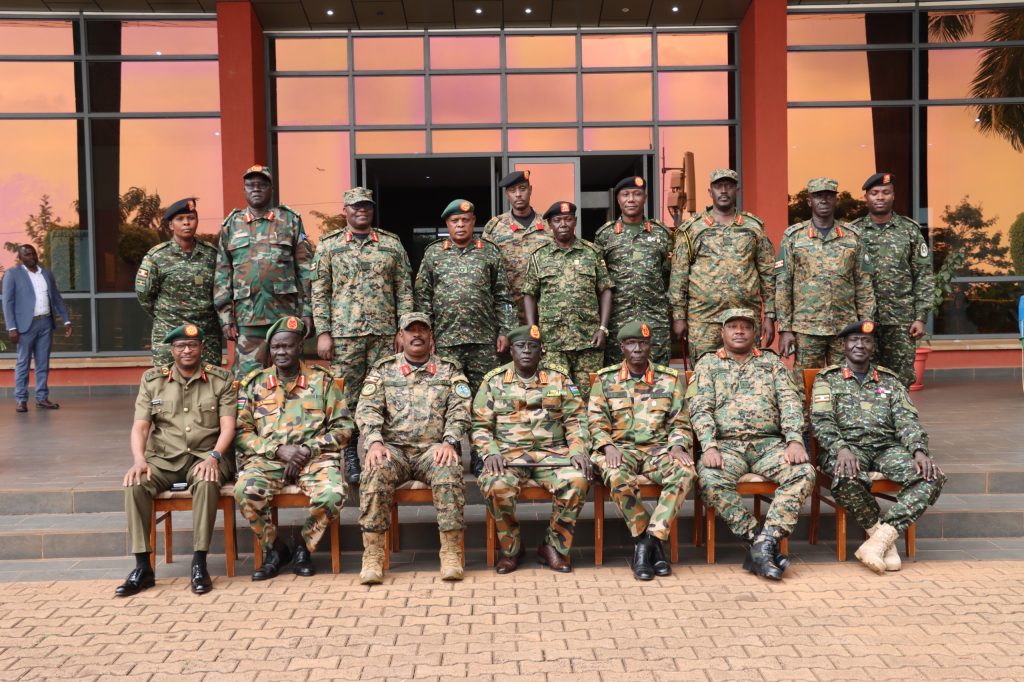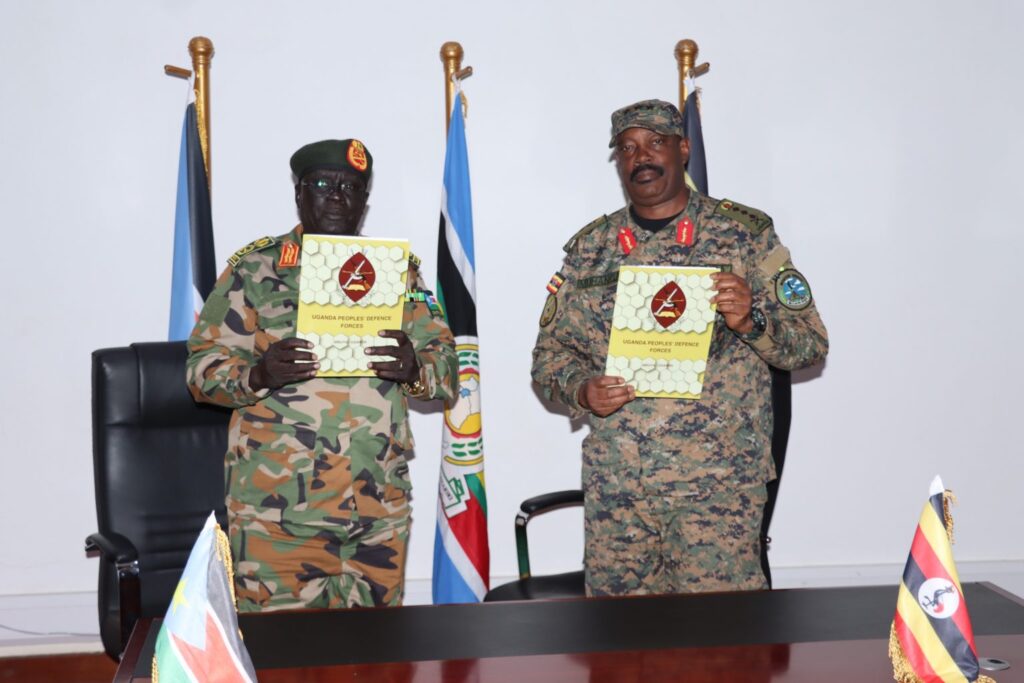The Uganda Peoples’ Defence Forces (UPDF) and the South Sudan Peoples’ Defence Forces (SSPDF) have reaffirmed their commitment to working together in addressing recent security incidents along the shared border, the Directorate of Defence Public Information at the Uganda’s Ministry of Defence and Veteran Affairs (MODVA) said on Wednesday.
The pledge was made during a high-level meeting held at the Defence and Intelligence headquarters in Kampala’s Mbuya suburb, co-chaired by the UPDF Commander Land Force, Lt Gen Kayanja Muhanga, and the SSPDF Chief of Defence Forces, Gen Dau Aturjong Nyuol.
On 28 July, fighting erupted in South Sudan’s Kajo-Keji County after Ugandan forces accused South Sudanese troops of crossing into Uganda’s West Nile region and refusing to withdraw. South Sudanese officials, however, said Ugandan soldiers launched a surprise attack with tanks and artillery, killing five of their troops on South Sudanese territory. Thousands of South Sudanese have remained displaced from their homes after the fighting.
The meeting followed an invitation from Uganda’s Chief of Defence Forces, Gen Muhoozi Kainerugaba, to his South Sudanese counterpart after his recent visit to Juba, where he met President Salva Kiir.
Discussions focused on strengthening cooperation and security measures along the Uganda–South Sudan border.
Speaking on behalf of Gen Kainerugaba, Lt Gen Muhanga highlighted the longstanding ties between the two armies.
“All the struggles in the past that the SPLA went through, we were together,” he said. “Even here in Uganda, during our struggles against the rebels of Joseph Kony, the South Sudan Defence Forces stood with us.”
Addressing the recent border tensions, Lt Gen Muhanga stressed dialogue over confrontation.
“We need to approach this maturely and solve this problem. I am confident our discussions will find a remedy for the misunderstandings, which are not between the two governments nor the two armies,” he stated.
For his part, Gen Aturjong, delivering greetings from President Kiir, reiterated South Sudan’s commitment to joint action.
“Joining hands in joint operations will maintain security. Even the spoiler will not be given room to cause havoc to our local population along the border,” he said. “We will come out with something that can rescue the security and let our people live in good harmony.”

The meeting is expected to yield enhanced coordination and joint measures to safeguard border communities.
Senior officers present included Maj Gen Francis Takirwa, Deputy Commander Land Force; Maj Gen Richard Otto, Chief of Defence Intelligence and Security; Maj Gen Felix Busizoori, Commander 4 Infantry Division; Brig Gen Moses Wandera, Joint Staff Legal Services; and other senior officers from both forces.
In May 2022, UPDF killed three SSPDF soldiers and a South Sudanese policeman along the common border of Yumbe District in Uganda and Kakjo Keji in South Sudan’s Central Equatoria State.
At the time, Ugandan authorities accused the deceased of raiding Ugandan villages, robbing people of money, and looting livestock and properties. South Sudanese local authorities on the ground, however, countered that the Ugandan citizens had encroached and settled in South Sudan.
In October 2022, another confrontation happened between the two armies over a disputed border area between South Sudan and Uganda that claimed the lives of two SSPDF soldiers.
SSPDF Spokesperson Gen. Lul Ruai at the time said the UPDF launched an attack on an army base in South Sudan, leading to the killing of its soldiers at the Pogee border post in Eastern Equatoria State’s Magwi County.
The Ugandan army countered by saying they opened fire on SSPDF elements who tried to encroach into its territory by placing a border post at an area located two kilometers from the Ngomoromo border in Lokung Sub-County in Uganda’s Lamwo District.
Several border communities around South Sudan often complain about armed civilians, cattle raiders, and even armed forces from neighboring countries, especially Kenya, Uganda, and Sudan, encroaching on the country’s territory. This has always led to skirmishes and conflict along the disputed borders, but the Government of South Sudan has always called for calm, discouraged local governments from getting involved, and often promised that border disputes would be resolved by the national government and its neighboring counterparts.




